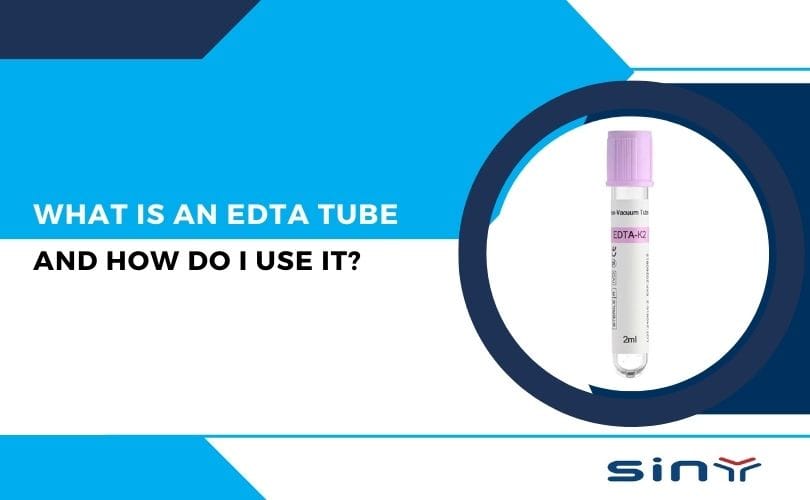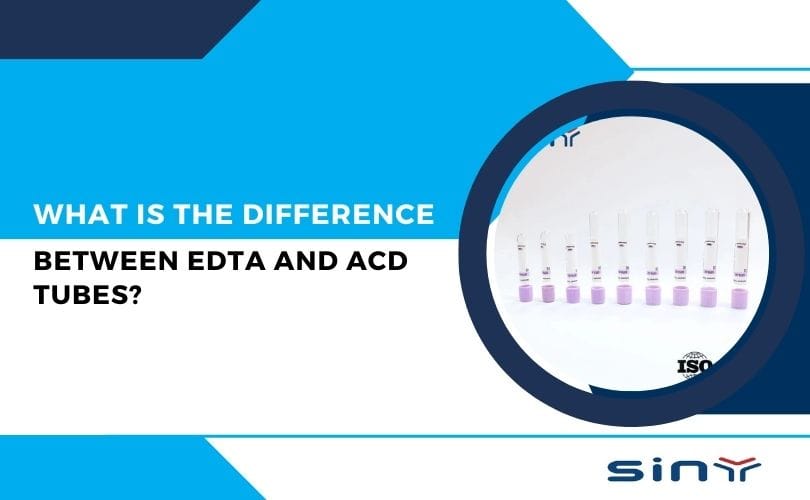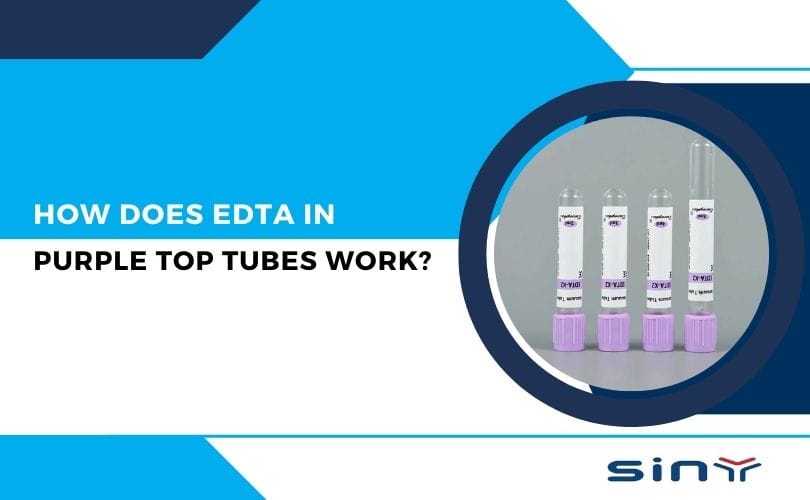EDTA Tubes have become a cornerstone in modern laboratory diagnostics, especially in the field of molecular biology and genetic testing. This comprehensive guide explores the science, applications, and best practices for using EDTA tubes in DNA testing, ensuring you have the most up-to-date and research-backed information. Whether you are a laboratory professional, a healthcare provider, or simply curious about the role of EDTA tubes in DNA analysis, this blog will provide you with everything you need to know.
What Are EDTA Tubes?
EDTA (Ethylenediaminetetraacetic acid) tubes are specialized blood collection tubes containing an anticoagulant that prevents clotting by binding calcium ions. These tubes are easily recognizable by their purple or lavender tops and are widely used in hematology, immunology, and molecular biology.
Key Features of EDTA Tubes
- Anticoagulant Properties: EDTA prevents coagulation, ensuring blood remains in liquid form for testing.
- Cell Preservation: Maintains cell integrity, making it ideal for complete blood count (CBC) and DNA/RNA extraction.
- Common Sizes: Available in 3mL, 5mL, and 10mL variants, catering to different lab needs.
For more details on EDTA tube specifications, check our EDTA Tubes for Blood Collection guide.
How Do EDTA Tubes Work? The Science Behind the Anticoagulant
EDTA acts as a chelating agent, binding to calcium ions that are essential for the blood clotting cascade. By sequestering these ions, EDTA effectively halts the coagulation process, keeping the blood sample in a liquid state. This is crucial for tests that require whole blood or plasma, as it preserves the integrity of blood cells and prevents clot formation.
Learn more about the principle of EDTA anticoagulant at EDTA Anticoagulant: Principles and Applications Explained.
Why Are EDTA Tubes Preferred for DNA Testing?
EDTA Tubes are the gold standard for DNA testing due to their ability to preserve nucleic acids. EDTA inhibits nucleases—enzymes that can degrade DNA—ensuring that the genetic material remains intact during storage and transport. This preservation is vital for accurate DNA extraction, amplification, and analysis, which are the foundation of genetic testing, forensic analysis, and advanced research applications.
Explore the full range of EDTA Tubes for Blood Collection and their specific benefits for DNA testing.
Why Are EDTA Tubes Suitable for DNA Testing?
Prevents DNA Degradation
DNA is highly susceptible to enzymatic degradation by nucleases present in blood. EDTA tubes inhibit these enzymes by chelating magnesium ions, which are essential for nuclease activity. This ensures high-quality DNA for downstream applications like PCR, sequencing, and genotyping.
Maintains Sample Integrity
Unlike serum tubes (which clot blood), EDTA tubes keep blood cells intact, allowing for white blood cell (WBC) isolation, a primary source of genomic DNA.
Long-Term Storage Stability
Studies show that blood stored in EDTA tubes can preserve DNA for weeks at 4°C and even longer at -20°C or -80°C. For more on storage conditions, read How Long Can Blood Be Stored in EDTA Tubes?
Comparison with Other Tubes
| Tube Type | Anticoagulant | Best For | DNA Stability |
|---|---|---|---|
| EDTA (Lavender Top) | EDTA | DNA/RNA extraction, CBC | Excellent |
| Heparin (Green Top) | Heparin | Plasma chemistry | Moderate (may inhibit PCR) |
| Citrate (Blue Top) | Sodium Citrate | Coagulation tests | Poor (low yield) |
| Serum (Red/Gold Top) | None | Serology, biochemistry | Very Poor (clotted blood) |
For a deeper comparison, explore our Top 5 Lab Tests That Require EDTA Tubes.
How to Extract DNA from EDTA Blood Samples
Step-by-Step Protocol
- Sample Collection: Draw blood into a purple-top EDTA tube and invert gently to mix.
- Storage: If not processed immediately, store at 4°C for short-term or -80°C for long-term preservation.
- Cell Lysis: Use a lysis buffer to break open WBCs and release DNA.
- Protein Removal: Treat with proteinase K to digest nucleases.
- DNA Precipitation: Add ethanol or isopropanol to isolate DNA strands.
- Purification: Use spin columns or magnetic beads for high-purity DNA.
For bulk lab needs, consider Bulk EDTA Tube Supply for Cost-Saving Labs.
How Long Can Blood Be Stored in EDTA Tubes for DNA Testing?
Blood samples collected in EDTA tubes can be stored for extended periods without significant degradation of DNA. Studies have shown that DNA remains stable for years when samples are stored at -80°C. For routine laboratory use, samples should be processed within 24–48 hours if stored at room temperature.
For a comprehensive storage guide, visit How Long Can Blood Be Stored in EDTA Tubes?.
Advantages of Using EDTA Tubes for DNA Testing
EDTA Tubes offer several advantages that make them the preferred choice for DNA testing:
Prevents Clotting: Ensures the sample remains in a liquid state for easy processing.
Preserves DNA Integrity: Inhibits nucleases and prevents DNA degradation.
Versatile Applications: Suitable for a wide range of molecular and hematological tests.
Cost-Effective: Affordable and readily available for laboratories of all sizes.
Learn more about the Advantages of EDTA Tubes for Blood Collection.
EDTA Tubes in Bulk: Cost-Saving Solutions for Laboratories
For laboratories and healthcare facilities that require large quantities of EDTA tubes, bulk purchasing offers significant cost savings. High-quality EDTA tubes are available in various sizes and configurations to meet the needs of different testing protocols.
Explore Bulk EDTA Tube Supply & Cost-Saving for Labs for more information.
Summary
EDTA tubes are a gold standard for DNA testing due to their anticoagulant properties, cell preservation, and long-term stability. Whether for genetic research, forensics, or clinical diagnostics, these tubes ensure high-quality DNA extraction.
For reliable EDTA tube suppliers, explore Sinymedical’s EDTA Tube Collection or watch our YouTube Channel for lab tips.
By choosing the right EDTA tubes, labs can enhance accuracy, efficiency, and cost-effectiveness in DNA-based testing.
FAQ
Can EDTA tubes be used for all types of DNA testing?
Yes, EDTA tubes are suitable for most DNA testing applications, including PCR, sequencing, and genotyping, due to their ability to preserve DNA integrity.
What is the difference between K2 and K3 EDTA tubes for DNA testing?
K2 EDTA tubes are generally preferred for DNA and RNA analysis as they minimize interference with nucleic acids, while K3 EDTA tubes are more commonly used for automated hematology analyzers.
How should EDTA tubes be stored before and after blood collection?
Store EDTA tubes at room temperature (4-25°C) and avoid exposure to extreme temperatures or direct sunlight. After collection, process samples within 24–48 hours for best results.
Can blood samples in EDTA tubes be frozen for long-term storage?
Yes, blood samples in EDTA tubes can be frozen at -80°C for long-term storage, preserving DNA quality for years.
Are EDTA tubes reusable?
No, EDTA tubes are designed for single use only to prevent contamination and ensure sample integrity.
Where can I purchase high-quality EDTA tubes?
You can find a wide selection of EDTA tubes at EDTA Tubes – High-Quality Blood Collection Tubes Manufacturer and Sinymedical.







